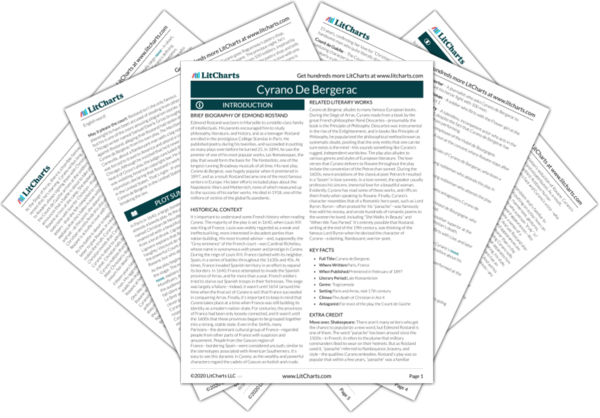During the Siege of Arras, the Count de Guiche tells his troops that he wears a white scarf on his uniform so that everyone can recognize that he’s a nobleman. And yet when de Guiche enters battle, he takes off his insignia, for fear that it will make him an easier target for enemy combatants. Humorously, we learn that Cyrano de Bergerac then takes this scarf from across enemy lines and wears it himself during the battle, even though doing so endangers his life. The white scarf is thus a clear symbol of “panache”—indeed, the word “panache” originally referred to the plumes that commanders wore in battle, and particularly the white plume (like de Guiche’s white scarf) warn into battle by the famous French monarch Henry IV. Cyrano, who chooses to live his life boldly, bravely, and flamboyantly, naturally takes the scarf for himself, not worrying about his own safety—and also flaunting the fact that he doesn’t worry about his own safety—and then mockingly returns the scarf to de Guiche after the battle. Panache is a difficult way to live one’s life, and most people—the Count included—can’t handle it.
The White Scarf Quotes in Cyrano De Bergerac
CYRANO (without lifting his eyes from his book):
And your white scarf?
DE GUICHE (surprised and gratified):
You know that detail?. . . Troth! It happened thus:
While caracoling to recall the troops
For the third charge, a band of fugitives
Bore me with them, close by the hostile ranks:
I was in peril—capture, sudden death!--
When I thought of the good expedient
To loosen and let fall the scarf which told
My military rank; thus I contrived
--Without attention waked--to leave the foes,
And suddenly returning, reinforced
With my own men, to scatter them! And now,
--What say you, Sir?

Unlock explanations and citation info for this and every other Cyrano De Bergerac quote.
Plus so much more...
Get LitCharts A+









